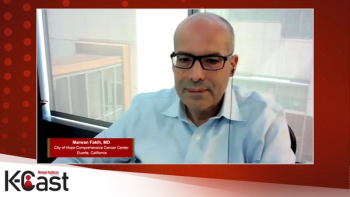Evolving SCAC Care: Clinical Perspectives on Innovation and Implementation

A panelist discusses how squamous cell cancer of the anal canal has nearly doubled in incidence over 30 years, with human papillomavirus infection being the primary risk factor that is significantly amplified by immunosuppression from conditions like HIV, immunosuppressive medications or organ transplantation, particularly affecting older patients and women at higher rates.

A panelist discusses how the historical standard of care for metastatic squamous cell anal carcinoma evolved from cisplatin-based regimens to carboplatin and paclitaxel as the established backbone treatment based on the InterAACT trial, which demonstrated superior progression-free survival and overall survival (20 months vs 12 months) with better tolerability, until recent changes with the POD1UM-303 trial shifted the current standard of care.

A panelist discusses how the most effective therapy for squamous cell anal carcinoma is prevention through human papillomavirus vaccination (which may reduce cancer rates in 10-20 years), while acknowledging significant unmet therapeutic needs including personalized approaches for high-risk locoregional disease with 40% recurrence rates and improved treatments for metastatic disease where median survival remains under 20 months, leading to the recent adoption of carboplatin/paclitaxel plus retifanlimab as the new NCCN-preferred first-line regimen based on the PODIUM-303 trial results.

A panelist discusses how the POD1UM-303 randomized phase 3 trial demonstrated that adding retifanlimab (a PD-1 inhibitor) to carboplatin and paclitaxel significantly improved progression-free survival from 7.4 to 9.3 months with a 37% reduction in progression risk, showed strong trends toward overall survival improvement (23 to 29.2 months despite 45% crossover), increased complete response rates from 14% to 22% and doubled median duration of response from 7.2 to 14 months, establishing this combination as the new standard of care for advanced squamous cell anal carcinoma despite manageable immunotherapy-related side effects.

A panelist discusses how the POD1UM-303 trial showed that no patient subpopulation was clearly excluded from benefiting from retifanlimab plus carboplatin/paclitaxel in terms of progression-free survival, though PD-L1-negative patients (representing only 10% of the study population) demonstrated a less robust overall survival signal compared to their positive progression-free survival benefit, suggesting that while PD-L1 status is not a validated exclusion biomarker, further research is needed to better understand the optimal benefit in PD-L1-negative patients given prior data showing lower response rates with PD-1 inhibitors in this subgroup.

A panelist discusses how given PODIUM-303's benefits across all subgroups, the primary patient population that should receive chemotherapy alone rather than the combination with retifanlimab would be those with contraindications to checkpoint inhibitors, specifically patients with autoimmune diseases such as irritable bowel disease, organ transplant recipients or those with severe rheumatoid arthritis requiring immunosuppressants, where the risks of checkpoint inhibitor administration outweigh potential benefits, while noting that no validated biomarker currently exists to exclude patients from retifanlimab treatment.

A panelist discusses how the FDA approval and NCCN endorsement of retifanlimab plus carboplatin/paclitaxel represents a milestone that should focus attention on adding PD-1 inhibitors to advanced squamous cell anal carcinoma treatment while highlighting future therapeutic opportunities including combination immunotherapies (PD-L1 with CTLA-4 inhibitors), bispecific antibodies targeting EGFR, cellular therapies targeting human papillomavirus-associated antigens E6/E7, and antibody-drug conjugates, emphasizing the critical need to disseminate this recent level-one evidence to providers and remove insurance barriers to ensure patient access to these important treatments.



